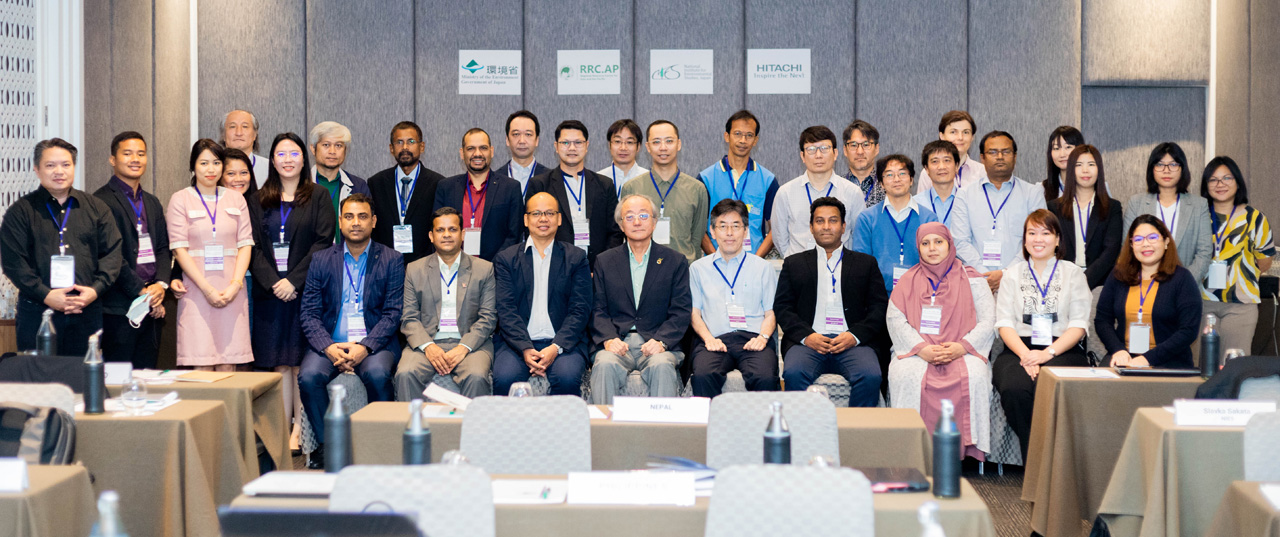Regional Training Workshop on Climate Adaptation Tools
29-31 May 2023
Bangkok, Thailand
AIT RRC.AP successfully organised the “Regional Training Workshop on Climate Adaptation Tools” from 29 - 31 May 2023 at the Sukosol Hotel, Bangkok, Thailand. The event was organised with financial support from the Ministry of Environment of Japan (MoEJ) and in collaboration with the National Institute for Environmental Studies (NIES), University of Tsukuba, and Hitachi, Ltd., Japan. The 3-day training workshop aimed to build a regional effort to understand and predict the local implications of climate change based on state-of-the-science climate modeling as well as translating climate projection results into innovative and results-driven interventions and practices on the ground. There were around 20 participants, including government ministry officials, researchers from government and private sectors, and research institutions from the Philippines, Bangladesh, Japan, Nepal, Vietnam, Myanmar, Thailand, Sri Lanka, and India.
Dr. Guilberto Borongan, Director of the Regional Resource Centre for Asia and the Pacific (RRC.AP), Asian Institute of Technology, Thailand, began with his opening remarks. He noted that unprecedented environmental changes are affecting ecosystems, economies, and the well-being of communities around the world. He expressed that the workshop represented an important step forward in the collective journey toward a more sustainable and climate-resilient future by unlocking the potential for transformative change and equipping participants with adaptation tools. This was followed by opening remarks from Mr. Orita Tomonori, Climate Change Adaptation Specialist, Global Environment Bureau, Ministry of the Environment, Japan, expressing that the MoEJ has developed adaptation tools to overcome the barriers of adaptation measures in vulnerable countries and to empower both government officials and those who tackle the adaptation issues on the ground. He encouraged all participants to make use of this opportunity for solving local adaptation issues in their countries. Prof. Kazuo Yamamoto, President of the Asian Institute of Technology, also gave his opening remarks. He stressed that the adverse effects of climate change are impacting the world on all fronts and adaptation actions are urgently needed and the climate adaptation tools that will be shared in the training workshop allow practitioners to evaluate local climate scenarios without having highly specialised technical skills. Lastly, he noted that the generated data from these tools can be used in the assessment of the impact, vulnerability, and adaptability to climate change.

The training workshop continued with a lecture and hands-on session on ClimoCast, an online tool for climate forecasting by Dr. Masutomi Yuji, Head of Asia-Pacific Climate Change Adaptation Research Section, Center for Climate Change Adaptation, NIES. Participants gained an understanding of the importance of accurate climate predictions and had the opportunity to explore ClimoCast's features, enabling them to access climate data and make informed decisions. The workshop also covered S8DS by Prof. Hiroyuki Kusaka from the University of Tsukuba, Japan and Mr. Shusaku Nakamura, Technical Manager, Pacific Consultants Co., Ltd., Japan. (virtually), highlighting the significance of downscaling techniques for analysing regional and local climatic data. Participants utilised the S8DS tool to interpret downscaled data and enhance the accuracy of climate projections for their areas. The final session focused on FloodS, a flood forecasting tool for climate change adaptation by Dr. Satoshi Yamaguchi, Chief Researcher, Research & Development Group, Hitachi, Ltd., Japan. Participants discovered how to leverage FloodS to assess flood vulnerabilities, develop early warning systems, and implement effective adaptation measures. Through hands-on exercises, participants gained valuable insights into flood-prone areas in their regions and proposed potential adaptation solutions.
The training workshop concluded with a series of presentations, wherein participants shared their findings and proposed adaptation solutions for their regions by developing project concept ideas. The presentations highlighted the practical implementation of climate adaptation measures tailored to the specific needs of each region, drawing upon the insights gained from the workshop's climate adaptation tools.
Dr. Guilberto Borongan's closing remarks and a ceremony to award certificates of completion to all participants on the final day of the training workshop marked the successful conclusion of the training workshop.
